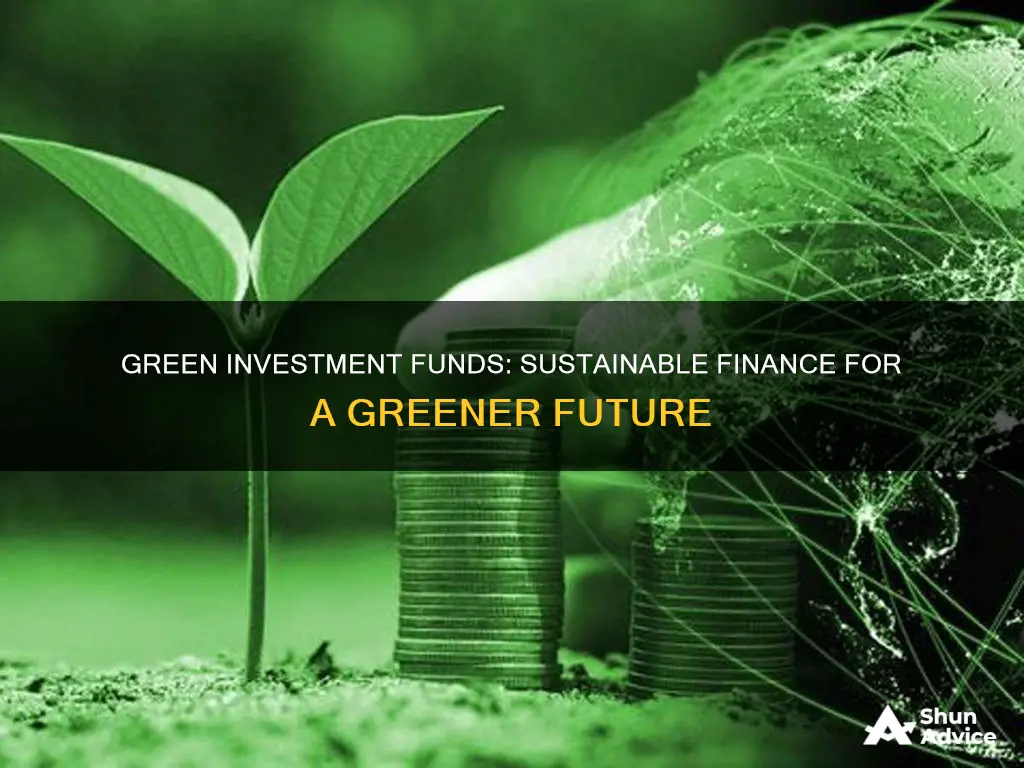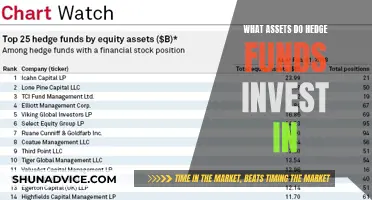
Green investment funds, also known as ESG (Environmental, Social and Governance) funds, are a way for investors to put their money into companies that aim to have a positive impact on the world, such as those with a small carbon footprint or diverse leadership boards. These funds are not individual stocks, but a collection of multiple stocks grouped together, which can decrease risk. ESG funds are graded using ESG principles and employ a range of different strategies to incorporate ESG criteria when building their portfolios. Some use positive screening to actively seek out companies with strong ESG performance, while others use negative screening to exclude companies involved in controversial activities such as tobacco, weapons, or fossil fuels.
| Characteristics | Values |
|---|---|
| Type of Investment | Mutual funds or exchange-traded funds (ETFs) |
| Investment Strategy | Positive screening, negative screening, or a combination of both |
| Focus | Environmental, social, and governance (ESG) issues |
| Risk | Similar to non-ESG funds, but ESG-focused funds try to avoid companies with high environmental risk and poor governance |
| Performance | ESG funds can match or outperform traditional funds |
| Cost | ESG funds may have higher expense ratios than traditional funds |
| Accessibility | Available to a wide range of investors, including those with a small initial investment |
| Impact | Investors can support specific missions like clean energy, women in leadership, etc. |
| Due Diligence | Research and consider ESG criteria, fund track record, fees, independent ratings, and certifications |
What You'll Learn

Environmental, Social, and Governance (ESG) funds
ESG funds are not individual stocks but rather a collection of multiple stocks grouped together, which can decrease risk. They are often referred to as sustainable investing, socially responsible investing, or impact investing.
The environmental component of ESG funds focuses on a company's impact on the natural environment, including air and water pollution, energy use, waste management, and climate change risks and opportunities. The social component examines a company's relationships with its employees, suppliers, clients, and communities, covering areas such as labour standards, equal employment opportunities, and community impact. The governance component looks at how a company is run, including transparency, ethics, shareholder rights, and board diversity.
When considering ESG funds, it is important to understand that not all funds are the same. Investors should carefully review the fund's prospectus, fees, and investment strategy to ensure alignment with their personal values and financial goals. Some key questions to ask include:
- Is ESG a core component of the investment selection process, or is it one of many factors considered?
- How does the fund weight each of the three ESG factors within its portfolio holdings?
- What specific criteria within each factor does the fund use to determine its holdings?
- How do the fund's fees compare to other investment options?
- What types of investments do you want the fund to include or exclude?
Overall, ESG funds offer investors a way to support companies that align with their values and promote positive environmental, social, and governance practices.
Get Funding for Investment Property Despite Bad Credit
You may want to see also

Fossil fuel-free funds
The definition of fossil-fuel involvement varies across different funds and organisations. For instance, Morningstar defines it as a portfolio's percentage exposure to companies that derive at least 5% of their revenue from thermal-coal extraction, thermal-coal power generation, oil and gas production, or oil and gas power generation, or 50% of their revenue from oil and gas products and services. On the other hand, State Street ETFs use the term "Fossil Fuel Reserves Free", but their funds still have overall fossil-fuel exposure ranging from 4.3% to 7.4%.
Fossil Free Funds, a project by As You Sow, is a search platform that helps individuals identify mutual funds and exchange-traded funds (ETFs) that do not invest in fossil fuel companies or those with high carbon footprints. This platform analysed 302 equity funds, finding an average fossil fuel exposure of 8% and $194 billion invested in fossil fuel stocks.
Green Century Funds is another example of a fossil fuel-free fund. They have comprehensive screens to ensure that investments are kept out of fossil fuel companies, including those involved in coal, oil, and gas, as well as fossil fuel-burning utility companies.
Pension Funds: A Secure Investment Option?
You may want to see also

ESG funds' impact on performance
Green investment funds, also known as Environmental, Social, and Governance (ESG) funds, are investment funds that consider ESG factors in their strategies. These funds invest in companies that aim to have a positive impact on the world, such as those with a small carbon footprint or diverse leadership boards.
The impact of ESG funds on performance has been studied, and the results suggest that while ESG funds can deliver financial returns, the overall effect is complex and depends on various factors. Here is an examination of the evidence:
Positive Impact on Firm Value and Profitability
Several studies have found a positive relationship between ESG performance and firm value and profitability. A study by Mahmut Aydoğmuş, Güzhan Gülay, and Korkmaz Ergun, for example, suggests that the combined ESG score has a significant positive association with firm value. Additionally, individual Social and Governance scores were found to have a positive and significant relationship, while the Environment score did not show a significant relationship.
Outperforming Traditional Funds
Studies by JUST Capital, Arabesque Partners, and others indicate that ESG funds can not only match but often outperform traditional funds in terms of performance. These findings suggest that investing in ESG funds may result in higher returns compared to non-ESG investment strategies.
Reduced Downside Risk
A 2019 white paper from the Morgan Stanley Institute for Sustainable Investing compared sustainable funds and traditional funds from 2004 to 2018. The research revealed that sustainable funds consistently exhibited a lower downside risk than traditional funds, indicating that ESG funds may offer a more stable investment option.
No Significant Performance Difference
However, not all studies have found a positive impact on performance. A close analysis by Sanjai Bhagat suggests that investing in sustainable funds prioritizing ESG goals may not significantly improve companies' actual ESG performance. Bhagat's work implies that ESG investing might even direct capital towards poorly performing businesses.
Higher Expense Ratios
While ESG funds offer the potential for strong performance, they often carry higher expense ratios than traditional funds. This means that investors in ESG funds may face higher costs, which can impact overall returns.
In conclusion, the impact of ESG funds on performance is multifaceted. While some studies suggest that ESG funds can enhance firm value and profitability, as well as outperform traditional funds, there are also indications that the impact on ESG performance may be minimal or even negative. Additionally, the higher expense ratios associated with ESG funds can offset potential gains. Therefore, investors should carefully consider their investment goals, risk tolerance, and values when deciding whether to incorporate ESG funds into their portfolios.
Mutual Fund Lump Sum Investments: Where to Begin?
You may want to see also

Active vs passive funds
Green investment funds are a type of investment fund that focuses on environmental, social, and governance (ESG) criteria. These funds invest in companies that aim to have a positive impact on the world, such as those with sustainable and ethical business practices. Some common approaches to ESG investing include negative screening, integration, and impact investing. Negative screening involves excluding companies that do not align with the investor's values, such as those involved in the tobacco or fossil fuel industry. Integration focuses on improving the risk-return profile by considering ESG factors in the investment process. Impact investing involves deploying investment funds to directly achieve a desired societal or environmental outcome.
When considering active versus passive funds in the context of green investment funds, it is important to understand the key differences between these two investment strategies:
Active Funds:
Active funds involve a hands-on approach, where a portfolio manager actively selects and monitors investments. Active fund managers aim to beat the market's average returns and capitalise on short-term price fluctuations. They have the flexibility to choose investments outside of a specific index and can use various hedging strategies to manage risk. Active funds often incur higher fees due to the extensive research, analysis, and transaction costs involved. The performance of active funds depends on the expertise and decision-making of the fund manager, introducing a level of management risk.
Passive Funds:
Passive funds, on the other hand, involve buying and holding investments over the long term, with minimal buying and selling. These funds aim to replicate the performance of a specific market index, such as the S&P 500 or Dow Jones Industrial Average. Passive funds have very low fees, good transparency, and tax efficiency due to their buy-and-hold strategy. However, they are limited to a specific index or set of investments and rarely beat the market in terms of returns.
Both active and passive funds have their advantages and disadvantages in the context of green investment funds. Active funds may be more suitable for investors who want more flexibility and control over their investments, and who are willing to pay higher fees for the potential of higher returns. Passive funds, on the other hand, may appeal to investors who prefer a more hands-off approach, lower fees, and are comfortable with returns that track the market. Ultimately, the decision between active and passive funds depends on an investor's goals, risk tolerance, and investment horizon.
A Beginner's Guide to BSE Index Fund Investing
You may want to see also

ESG criteria and ratings
Green investment funds, also known as ESG (Environmental, Social, and Governance) funds, are investment vehicles that focus on companies that align with specific values or have a positive impact on the world. These funds allow investors to support environmentally and socially responsible businesses while potentially achieving financial gains.
ESG Criteria
ESG criteria are the specific factors used to assess a company's performance on environmental, social, and governance issues. These criteria help determine whether a company aligns with the values and impact goals of a green investment fund. The criteria can vary among different rating agencies, but here are some common factors:
Environmental Criteria
- Greenhouse gas emissions
- Renewable energy usage
- Soil and water contamination
- Environmental policy
- Treatment of animals
Social Criteria
- Business relationships with employees, suppliers, partners, and shareholders
- Ethical treatment of workers
- Living wages and employee benefits, such as sick leave
- Safe working conditions and regular facility inspections
- Charitable contributions and community impact
Governance Criteria
- Compliance with legal and regulatory requirements
- Board diversity and representation of diverse perspectives
- Executive compensation and comparison with industry peers
- Shareholder rights and corporate governance practices
ESG Ratings
ESG ratings are quantitative evaluations of a company's performance on ESG criteria. These ratings are typically provided by third-party organizations and agencies, such as Bloomberg ESG Data Services, Sustainalytics, MSCI, and RepRisk. The ratings help investors compare companies and make informed investment decisions.
ESG ratings are usually presented on a numerical scale or a letter ranking system. For example, a rating of 70 or above is often considered strong, while a score below 50 indicates room for improvement. However, it's important to note that rating scales and methodologies can vary across different agencies.
When considering ESG ratings, investors should:
- Compare ratings from multiple providers to get a comprehensive understanding of a company's performance.
- Evaluate other factors, such as financial performance and industry trends, in conjunction with ESG ratings.
- Be aware of potential limitations, such as greenwashing or self-reported data, which may impact the accuracy of ESG ratings.
In conclusion, ESG criteria and ratings are essential tools for assessing the sustainability and ethical performance of companies within green investment funds. They provide a framework for investors to identify businesses that align with their values and contribute to a more sustainable global economy.
A Guide to Investing in Australia's Managed Funds
You may want to see also
Frequently asked questions
Green investment funds are funds that allow investors to invest in companies that align with their values, such as environmental sustainability and social responsibility. These funds are often referred to as Environmental, Social, and Governance (ESG) funds and may be in the form of mutual funds or exchange-traded funds (ETFs).
There are two main types of green investment funds: passively managed funds and actively managed funds. Passively managed funds track an index, such as the S&P 500, while actively managed funds pick investments based on the fund manager's research.
Green investment funds use different strategies to incorporate ESG criteria into their portfolios. Some funds use positive screening to actively seek out companies with strong ESG performance, while others use negative screening to exclude companies involved in controversial activities such as tobacco, weapons, or fossil fuels.
Investing in green investment funds allows individuals to align their investments with their values and support companies that prioritise sustainability, social responsibility, and good governance. Additionally, studies have shown that ESG funds can match or even outperform traditional funds in terms of performance and have consistently shown lower downside risks.







